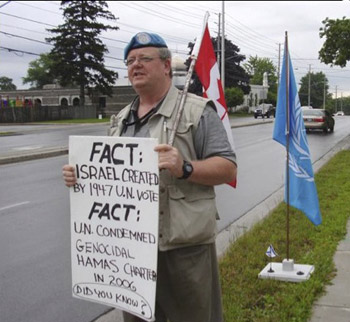Civil rights activist Mark Vandermaas, organizer of a one-day London, Ont.-based conference meant to counter Israeli Apartheid Week (IAW) events, wants Canadians to know the truth.
“We have to understand that the average person in Canada couldn’t find Israel on a map, never mind understand all the intricacies and myths that are being [spread] by the IAW crowd. They’re lying to you,” said Vandermaas, who served in a United Nations peacekeeping force in the Middle East in 1978.
Vandermaas said his motivation to organize this event, called Israel Truth Week and held March 21 at the London Royal View Church, stemmed from a lesson he learned as a child.
“My parents lived under Nazi occupation in Holland, and they saw Jews taken away. They were not Jews themselves, but my father escaped from a Nazi war camp,” he said.
“I grew up with an interest in the period and learned a lot about the Holocaust.”
He said his research into the Holocaust taught him that it’s important to speak out against injustice when the warning signs are present – especially when it doesn’t affect you directly.
“In this world today, we can see grave dangers facing Jewish people. When the despots and the monsters of the world start coming for Jewish people, I’m not [safe],” he said.
Vandermaas publicly entered the Israeli-Palestinian debate last year after being an outspoken critic of the handling of protests that erupted in Caledonia, Ont., in 2006, when aboriginals demonstrated for nearly a year against a construction site they said was on native land.
He said he discovered that a London mosque had hosted a fundraising dinner to support a Canadian boat, called the Tahrir, that intended to breach the Israeli naval blockade on Gaza last July.
“I don’t care whether it is a mosque or a United Church, but when a religious insitution is helping to raise money and support a project which, if successful, will enable more Jews to get killed and more Palestinians to die when Israel has to defend itself against war crimes, that’s immoral,” he said.
He said he spent an hour a day for 26 days standing outside the mosque, donning his UN blue beret, holding a sign that said Israel was created in part by a UN resolution that passed in 1947, and that the Hamas charter was condemned by the UN Human Rights Commission in 2006.
“When the vigil was over, I still wanted to do something to counter Israeli Apartheid Week, but I wasn’t sure how to do it,” he said.
When Vandermaas learned about a group of Jewish student at the University of Western Ontario (UWO) whose event that celebrated Israeli culture was shut down by anti-Israel protesters in February, he was galvanized into action.
“There was no way that these Jewish students should feel abandoned. I wanted to let them know they’re not alone, and there were people who were watching,” he said.
Vandermaas added that he was further motivated by a video he saw of UWO professor David Heap, who was aboard the Tahrir last summer.
Vandermaas said that when Heap was asked how he responds to the argument that Israel must defend itself against missiles from Gaza, Heap said that argument deflects attention from the real issue.
“That made me so angry because what that statement means… is that they deny the existence of the victims. When you do that, you deny the humanity of the victims,” Vandermaas said.
His conference, which featured talks from such people as UWO political science professor Salim Mansur and Massachussetts-based Rabbi Jonathan Hausman, who was the keynote speaker, was meant to demystify the conflict.
“We’re making the debate too complicated,” Vandermaas said, adding that the basis of the Middle East conflict is antisemitism.
“We need to stop pretending that giving more land, surrendering land is going to bring peace to the Middle East… history has shown that it won’t bring peace ever.”
Vandermaas said he finds the oft-used argument that Israel is in violation of numerous UN resolutions to be ironic.
“It’s interesting to me that pro-Palestinians seek legitimacy from the same organization that created Israel, but yet, deny [Israel’s] legitimacy. It’s hypocricy in the extreme,” he said.
“If you won’t even acknowledge that the United Nations voted to create a two-state solution in 1947 and the fact that Israel was attacked after declaring a state, I don’t think I can go any further. That’s the end of the discussion.”
This article appears in the March 29 issue of The CJN
